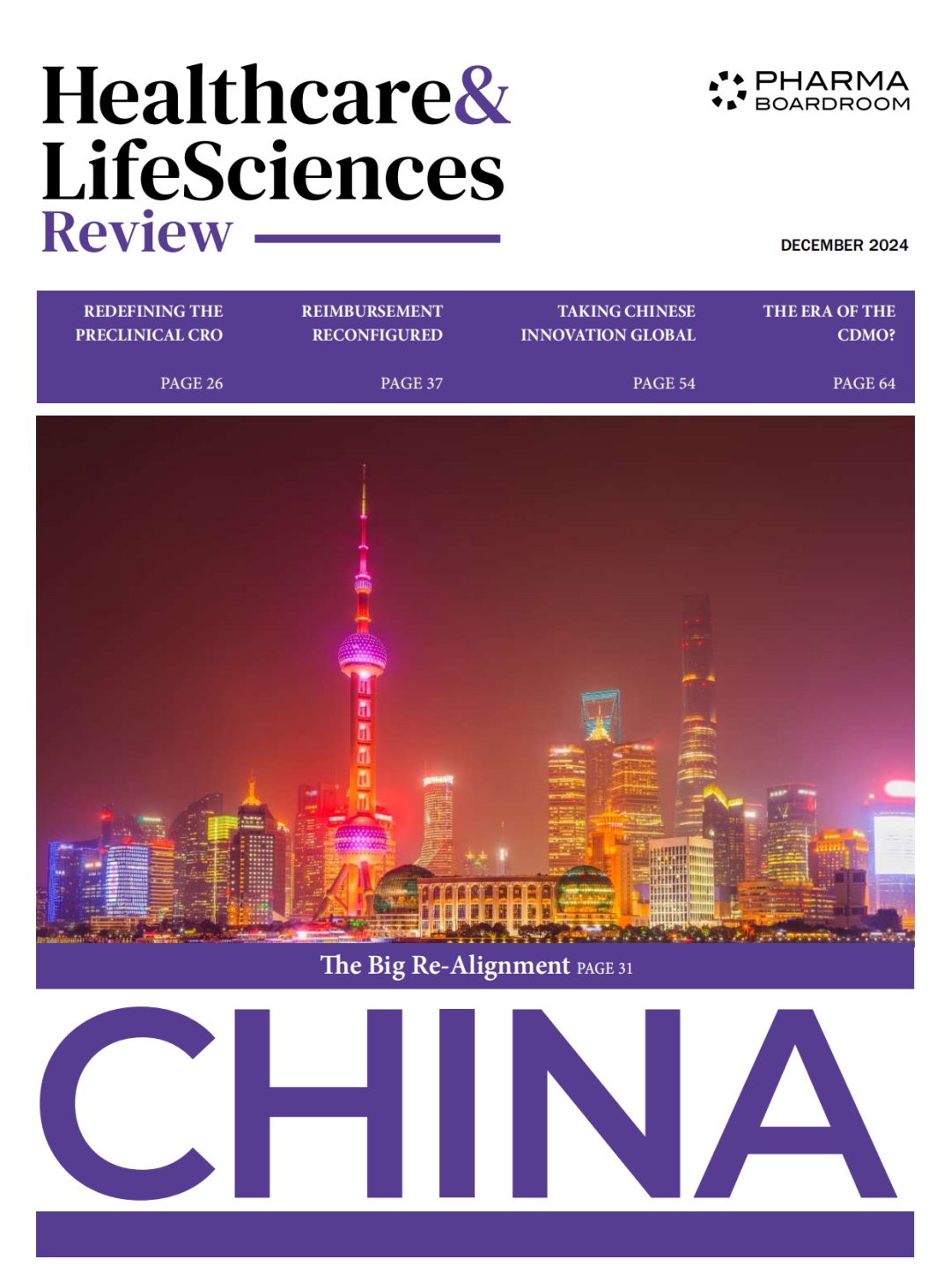 News & Events
News & Events
 phirda
phirda  2024.12.27
2024.12.27
 1781
1781
In December 2024, the international media outlet PharmaBoardroom officially published the Healthcare & Life Sciences Review China 2024, highlighting China’s prominent role in the global pharmaceutical innovation landscape, particularly in innovative drug research and development, industrialization, and international collaboration. As China’s life sciences sector experiences rapid growth, global pharmaceutical companies and industry leaders are showing increasing confidence in the Chinese market. The country’s pharmaceutical industry is steadily evolving from a 'follower' to a global 'leader' in innovation, actively integrating into the global pharmaceutical innovation ecosystem.

Song Ruilin, Executive President of the China Pharmaceutical Innovation and
Research Development Association (PhIRDA), was invited to write the foreword for
this review. In his foreword, he highlights PhIRDA is dedicated to promoting
innovation, industrialisation, and internationalisation within the Chinese
(bio)pharmaceutical industry, and this report showcases the fantastic progress
made on all three of these fronts. China has shifted from a buyer to a
contributor of pharma innovation, with a host of China-developed drugs now
available both at home and abroad and making a real difference to global health.
Additionally, the number of multi-region clinical trials initiated by Chinese
firms has risen sharply in the past few years, while multinational firms are
striking deals with a wide range of local biotechs, recognising the local and
global significance of these companies’ work.
The regulatory framework in our country is much improved, especially for orphan drugs, and China aligns fully with international standards. China’s regulatory body – the National Medical Products Administration (NMPA) – has well-founded ambitions to become a tier-one global regulator, which would further increase the speed with which new therapies can reach the market. Moreover, the government has been taking proactive measures on disease prevention and access – including expanding basic medical insurance to over 95% of the population, as part of the ‘Healthy China 2030’ initiative. All of these developments have helped foster an increased number of pathways for biomedical innovation to ultimately reach patients.
Looking forward, China aims to lead in developing "best-in-class" and "first-in-class" drugs while fostering deeper international partnerships. No single scientist, company, or country alone can move the needle on the most pressing healthcare challenges facing the world today. Therefore, we will continue to advocate for openness and share the mutual benefits that result from global collaboration.
Several PhIRDA member company executives were also interviewed by PharmaBoardroom, offering positive views on the innovation and internationalization of China’s pharmaceutical industry.
James Xue, Founder, Chairman, and CEO of CANbridge Pharmaceuticals, stated that China’s regulatory reforms have significantly enhanced the global competitiveness of domestic pharmaceutical companies, particularly in the fields of biopharmaceuticals and immunotherapy. With optimized drug approval processes, the pace of innovative drug development and commercialization will accelerate, offering more treatment options to patients worldwide.
Chen Li, Founder, Executive Director and CEO of Hua Medicine, noted that China’s pharmaceutical regulatory reforms have driven rapid development in the entire industry, particularly in oncology, diabetes, and rare diseases. China’s innovative drugs are gradually filling gaps in the global market, providing more innovative treatment solutions to patients around the world.
Wang Yinxiang, Chairman and CEO of Jacobio, believed that China’s pharmaceutical regulatory reforms have not only accelerated innovation among local companies but have also created a more equitable market environment for multinational pharmaceutical companies. Domestic and multinational companies are increasingly collaborating to jointly drive the development of innovative drugs and technological advancements on a global scale.
Nisa Leung, Managing Partner of Qiming Venture Partners, pointed out that the pharmaceutical regulatory reforms have brought more opportunities and confidence to the capital markets, fully unleashing the growth potential of innovative pharmaceutical companies. Qiming Venture Partners will continue to support and assist the internationalization of Chinese pharmaceutical companies, driving more promising innovative drugs into the global market.
Jasmine Cui, Chairman and CEO of Innocare, emphasized that with the gradual improvement of China’s regulatory environment, particularly in aligning the approval of innovative drugs with international standards, more local companies are launching competitive innovative drugs to international markets through independent R&D. Innocare will continue to increase investment in research and development to drive more high-quality innovative drugs into the global market.
Ronald Tam, CFO of XTALPI, noted that China’s pharmaceutical regulatory system reforms provide a more efficient R&D and market entry process, especially in terms of technological innovation and clinical trials. XTALPI will continue to leverage the advantages of the Chinese market to drive global drug R&D and technological collaboration.
As China’s pharmaceutical regulatory reforms deepen, global pharmaceutical innovation cooperation is moving toward a more open, win-win direction. In the face of global health challenges, international collaboration is more crucial than ever, as no single enterprise or country can address complex medical issues alone. We will continue to advocate for open collaboration, promote global cooperation, and work together to achieve a healthier and more sustainable future!

 News & Events
News & Events
 2026-02-11
2026-02-11
 52
52

 News & Events
News & Events
 PHIRDA
PHIRDA  2026-01-19
2026-01-19
 99
99

 News & Events
News & Events
 PHIRDA
PHIRDA  2025-12-30
2025-12-30
 146
146